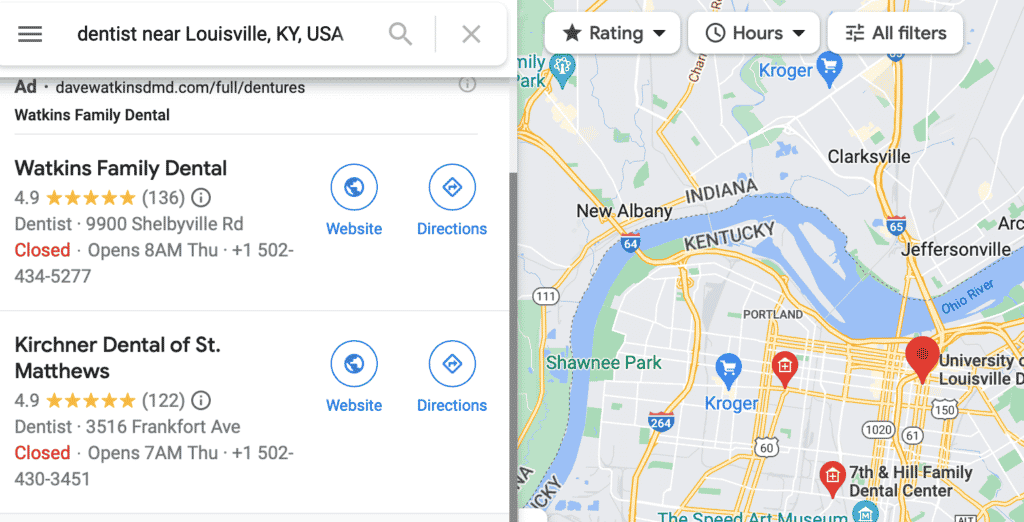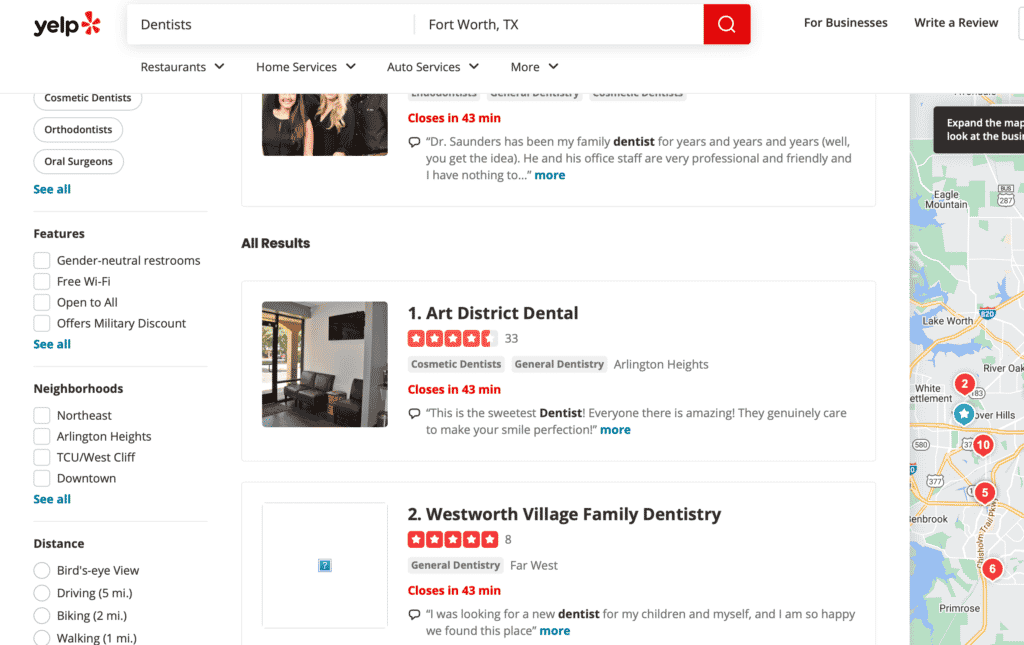How to Improve Dental SEO
According to Google, people tend to search three times before scheduling an appointment. And, people typically only look at websites that come up on the first page of their Google search results. What does that mean? Dentists need an effective dental SEO strategy to rank high in local search engine results. What is local SEO […]

According to Google, people tend to search three times before scheduling an appointment. And, people typically only look at websites that come up on the first page of their Google search results. What does that mean? Dentists need an effective dental SEO strategy to rank high in local search engine results.
What is local SEO and dental SEO?
Local SEO:
If someone types “dentist near me” into Google, they’ll see a list of dental practices close to their location. The ones that are listed at the top are those with the strongest SEO (search engine optimization.) Having a great SEO strategy is important so that your dental practice can be one of the first results in the list, or show up as a results on Google Maps.
Most marketing companies can help businesses improve their SEO score. But local SEO takes a specific type of strategy. That’s because unlike big national brands that sell products all over the country, dental practices work locally. Your practice’s website does not need to show up for a person seeking dental services on another continent. Your website needs to show up for people nearby.
Dental SEO:
Every local service provider needs a local SEO strategy, but that doesn’t mean that what works for your hair stylist will work for you. Our dental SEO experts have tried and tested nearly every local SEO strategy in the book. We’re sharing time-tested dental SEO strategies that work for, well, dentists. These tips will help you to understand if you might need to change your current SEO approach.

Dental SEO Tips to Improve Local Search Rankings
1. Focus on updating your dental services pages (not just blog posts).
The written content on your website is a huge factor in your SEO score. It’s how Google ranks your site for authority and relevance. Blogging is one of the primary ways to generate consistent, high-quality content for your website. Your content strategy should include blogging to establish yourself as the expert in your specialty. But for local SEO purposes, dental practices need to do more than blog.
We’ve found a good way to attract locals to your website is through your Dental Services pages (i.e. your Invisalign page, Dental Implants page, etc…). Here are some tips to improve local SEO with content on those pages:
- Create individual pages on your website for your most popular services
- Provide solutions to common oral health problems for your target patients
- Answer frequently asked questions about the procedure or process
- Include examples and before/after photos, where relevant
- Be sure to include your geographical location on this page. You can include your address, but also provide directions or nearby landmarks
2. Optimize all of your website content with SEO best practices
Here are some tips for writing content that ranks higher on search engines:
Optimize your titles. On blog posts and website pages, optimize your titles. Include keywords that you want to rank for and your location with titles like “Best Orthodontist in Louisville.” Make sure your titles are between 40 and 60 characters.
Content comes in many forms. Besides text, use infographics, branded before and after photos, patient testimonials, and industry news on your website. Improve your dental SEO strategy for videos by reading this article.
Encourage people to stay. You want people to linger on your website for a while. The goal of content is to build your Expertise, Authority, and Trust (EAT). Having quality content in many formats, answering people’s questions, and updating your site frequently with news and events helps increase the amount of time people will spend on your site.
3. Use targeted keywords (without keyword stuffing)
Using the right local and dental keywords will be an important part of your dental SEO strategy. It’s important for your website to include words that describe your location, your dental services, and answers to questions your patients might ask. (For example, the types of insurance you accept.) A good dental marketing agency should be able to help you research which words and phrases to use. We use tools like Moz and SEMrush for our clients.
But, using keywords correctly requires finesse. Crowding your website with “Best Orthodontist in Kansas City” on every page won’t work. This is known as “keyword stuffing,” and it will actually hurt your SEO score.
A keyword strategy requires research and experimentation. Here are a few tips:
- Stick to 1-3 keywords per page
- Use Google Search Console to find targeted keywords that hold a SERP (Search Engine Result Page) position close to the top 3 results
- Conduct research to figure out which keywords patients are already using to find your practice
- Make sure to include keywords about your specific services
- Your geographical location should be part of your keyword strategy
- Use these keywords on your services pages, in your blogs, and on other pages on the site
4. Get high-quality links from local websites
An important part of dental SEO is making sure other websites directly link to yours. These are called backlinks.
Backlinks help Google know that you’re a legitimate business. And, it helps Google understand how you’re connected to other organizations in the community. For dentists, we’ve found some of the most effective links come from local businesses and relevant community organizations.
Here’s the challenge: it’s not always relevant for a restaurant or clothing store near your practice to link to your page on their website. You have to get creative! Here are some strategies we’ve used for dentists:
Sponsor events at schools and nonprofits in your area. When they post about the event, they will link to your website as one of the event sponsors.
List your practice on local citation websites along with your address. These can include the Yellow Pages, Dentists.com, Yelp, The American Dental Association, and Zocdoc.
Experiment. We encourage our clients to be meticulous and wide-reaching in their quest to leave a local digital footprint. Comment on dental blogs and dental forums; make listings on local dental association websites. Nothing is ever certain with search engine algorithms. But such attention to detail would do more good than harm to your SEO ranking.

5. Keep your Google My Business profile updated
Google My Business is an important part of dental SEO. It helps Google as a search engine to categorize your dental practice. You might think that creating a Google My Business profile is a one-time thing. But the truth is, to give yourself every competitive advantage in search engine results, you need to be constantly updating your listing.
Here are the steps:
- Create a Google My Business profile
- Add your address, your local phone number, and pictures of you and your practice
- Add your industry and specialization
- Encourage patient reviews!
- Regularly update your holiday hours
- Respond to all questions
- Keep your services up to date
- Use Google Post. (It lets you post short updates about your business that can appear on your Google My Business profile. You can let patients know about new services, promos, or events you might be offering.)

Dental SEO for Your Practice
A one-size-fits-all SEO strategy won’t increase the quality and quantity of traffic to your dental website. If you want to work with a dental marketing agency that will persist to find the right combination of techniques for your dental practice, contact our agency so we can start helping you get your website to rank higher on Google.